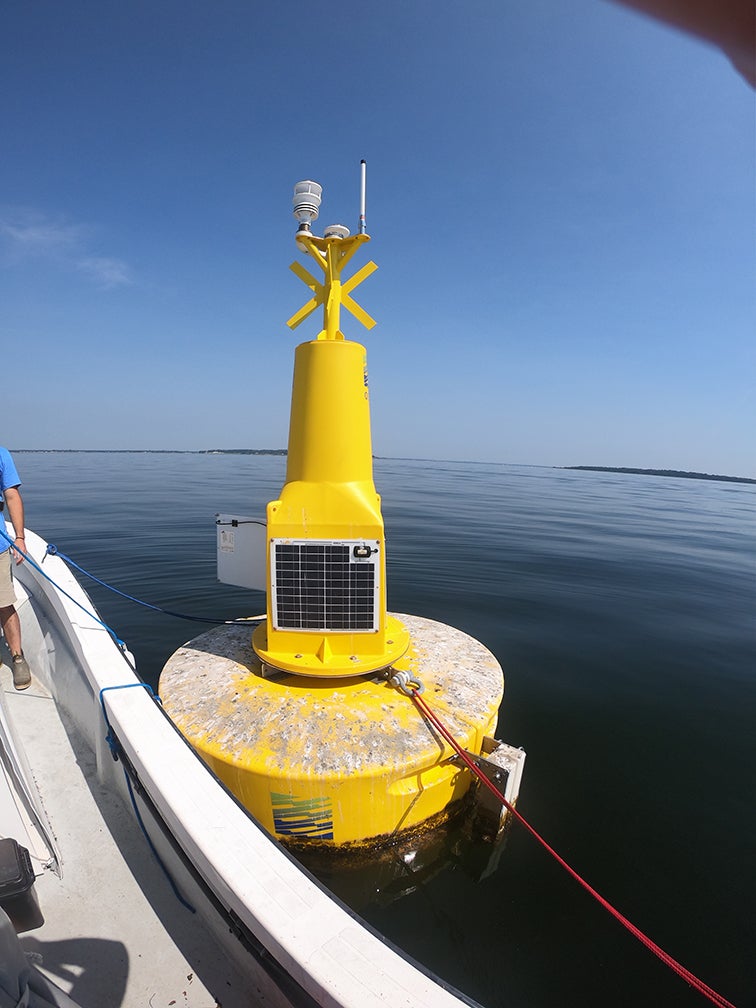KINGSTON, R.I. – Nov. 3, 2022 – Undergraduate students from colleges and universities across Rhode Island headed to the University of Rhode Island this past summer, using EPSCoR (Established Program to Stimulate Competitive Research) funds to study multiple aspects of Narragansett Bay, from drones to seawater nutrients; students from Rhode Island School of Design even explored how to communicate scientific research using visuals and design.
The University’s EPSCoR program invites undergraduate students from Rhode Island to join in this research annually. Students in the program get a 10-week introductory research experience, helping them to make informed decisions on where their education and career might go. EPSCoR brings in federal and state money, helps generate research infrastructure and trains the next generation of scientists under RI C-AIM (RI Consortium for Coastal Ecology Assessment Innovation & Modeling), EPSCoR’s current grant led by URI. Now in its fifth year, the program has brought $57.7 million into the state, with research focused on Narragansett Bay and the impacts of climate change on coastal ecosystems.

Over the years, a number of undergraduates have enjoyed the chance to contribute to research in the EPSCoR program. Mason Jacob ’24, an aspiring multidisciplinary engineer, is one and shared more about what an EPSCoR research experience is like. “I gained important knowledge about research as a whole,” he said, “made valuable personal connections, and improved my ability to communicate my work.”
Jacob found the EPSCoR fellowship to be the perfect summer undertaking for his interests and intellectual curiosity. Jacob joined the Narragansett Bay Observatory Project, which gathers real-time data and monitors ecological changes via buoys placed in Narragansett Bay. These floating labs measure offshore conditions in fine detail, sharing information on changing ecological conditions right here in the bay.
Jacob helped efforts to better understand the ecosystem dynamics that contribute to the growth of harmful algal blooms which disrupt the shellfish industry and coastal communities. Shellfishers in the bay are concerned for good reason — the blooms produce dangerous neurotoxins which can accumulate in shellfish tissue.
An electrical engineering major, Jacob was able to widen his skillbase by taking on mechanical engineering and computer science challenges. His work focused on the physical structure of the buoy platforms that send data to the Narragansett Bay Campus for analysis. The buoys — currently deployed off Jamestown and in Greenwich Bay — collect high-resolution data to inform predictive algorithms that can forecast the likelihood of a bloom event based on real-time conditions in the bay.
The URI engineering major got to completely redesign the sensor’s clamps to improve data gathering, which in turn will allow for better data management decisions — and, hopefully, mitigate economic impact and risks to human health.
Jacob created and manufactured two types of clamps to fit four different sensors, using CAD software and 3D printing, all complete redesigns of the clamps previously in place. Now the oceanographic sensors are better attached to the buoys and eliminate the need for tools when divers service the sensors. Instead of juggling a 6mm bolt and hex wrench while staying afloat in the shifting ocean, divers can now simply detach the latch and unscrew the knob. More secure clamps also put an end to data transmission blackouts.
“I learned that research is more similar to engineering than I originally thought,” Jacob said. “’Problem-solving’ is the common denominator.” He’s glad his expertise could contribute to the Bay Observatory Project, solving problems that were hindering the team’s ability to collect needed data for the bay and for human health.
Jacob was mentored by RI C-AIM postdoctoral fellow Kristofer Gomes and said he obtained a better understanding of what it means to be a successful researcher. “The skills I gained will benefit my development on all fronts — personal, educational, and professional,” he said. “I gained a lot from this and would encourage other interested students to apply.”
Joining other student researchers for their presentations was a highlight, Jacob said, noting how good it felt to do “academic research with real, local impact” alongside peers from across the state.
EPSCoR at URI
The work conducted at URI through EPSCoR has revealed new insights into Narragansett Bay and brought the University closer to predictive models to anticipate changes in the bay at all levels, from nano-scale nutrients to the seafood we eat in local restaurants.
Researchers here are also celebrating the results of EPSCoR’s promising research on the bay. EPSCoR is supported by a $19 million National Science Foundation grant, matched by the state, and brings together engineers, scientists, designers, communicators and undergraduates from colleges across the state, positioning Rhode Island as a ‘center of excellence’ for research on Narragansett Bay and beyond. Since the program’s inception in 2017, 169 undergraduates like Jacob have received hands-on research training through the EPSCoR network.
Dr. Geoffrey Bothun, principal investigator and project director of Rhode Island C-AIM, reflected on the most recent year of the award.
“Our Bay Observatory has expanded our ability to observe the effects of climate change on coastal ecosystems, enabled novel sensor development, and offered new opportunities to educate students and engage stakeholders,” said Bothun. “Most important is the impact we have had on the next generation STEAM workforce, with over 300 students and postdocs poised to contribute to the scientific and economic goals of our state and nation.”
URI, on behalf of the state, has submitted another proposal to continue to support cutting-edge research and workforce development activities in Rhode Island; the next focus for EPSCoR funding will be research that examines marine plastic pollution and innovative ways to mitigate or prevent the impacts.
Applications for undergraduate researchers will open in December. The program is open to any Rhode Island college student and all majors are encouraged to apply. Learn more.
See more at The Current.

